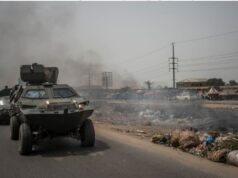NATO should probe war crimes if it cares about human rights in Afghanistan

Dated : 11 Dec 2020 (IST)
US-led coalition forces entered Afghanistan with the narrative of the “war on terror” following the September 11 attacks in New York City in 2001.
Since then, this nearly two decades old conflict has had a devastating impact on the lives of Afghan civilians. They have bore the brunt of this never ending war with constant human rights atrocities.
Recent revelations that a handful of Australian elite soldiers conducted “competition killing” and “blood lust” and “inhumane and unnecessary treatment of prisoners” on Afghan civilians grabbed global headlines, and outraged Afghan people — causing an outpouring of grief and calls for justice.
A four-year long investigation made by Major General Justice Paul Brereton found that “throw-downs” or planting weapons on innocent people, followed with fake “cover story” narratives, were used to justify torture and executions performed during interrogations performed by Australian troops.
At least 39 Afghan civilians- including prisoners, farmers and civilians – were summarily murdered by Australian elite soldiers during the war between 2001 and 2015.
One Afghan man was allegedly used as “target practice.” The throats of two 14-year-old boys were slit and their “bodies were bagged and thrown in a nearby river.”
American and British special forces were also allegedly involved in war crimes. “Blooding” and “warrior culture,” the name some Aussie Special Air Service units adopted, have roots in colonial history.
This violent tradition saw Afghan non-combatants toyed with as sacrificial lambs. Subsequent to the findings, Australian Prime Minister Scott Morrison expressed his apology to Afghan state and nation.
Chinese Foreign Ministry spokesman Zhao Lijian raised eyebrows when he tweeted, “Shocked by murder of Afghan civilians and prisoners by Australian soldiers. We strongly condemn such acts and call for holding them accountable.”
This was accompanied with a photo-cartoon which showed an Australian soldier holding a knife to the throat of a horrified Afghan child against a backdrop of their two national flags.
In response, Morrison adopted a defensive tone as he branded it “repugnant” and demanded an apology.
The Chinese government refused. It is self-explanatory that trampling upon the human rights of the Afghan people and spilling the blood of non-combatants under the narrative of the “war on terror” is “unforgiveable.”
Afghan soldiers and civilians have paid heavy sacrifices within the last couple of decades in campaign against terrorists. They put their lives at stake to advocate democratic principles and human rights discourse.
Lately, however, Afghan people lost their hope and trust in coalition forces. To one’s unmitigated chagrin, the recent tragic findings about civilian torture and death did not raise eyebrows of a number of states which had changed the narrative of “war on terror” to “protection of human rights,” claiming to be the advocates of human rights and humanitarian law. Ironically, NATO member countries have remained silent about this egregious misconduct.
Meanwhile, Canberra is unwilling to explain the violence and media outlets in Australia maintain that police investigations might take years before possible criminal trials.
That is to say, Australian authorities and local media coverage of the revelations have adopted a defensive tone as officials, along with political pundits, try to show the war crime and misconduct were only done by a few “bad apples.”
They say it is similar to some American soldiers tortured and killed Iraqi individuals at Abu Ghraib prison. Australia’s media coverage did not reflect the feelings of the Afghan people or concern itself with the victims either.
Earlier, the Trump administration imposed sanctions against International Criminal Court (ICC) employees who investigated suspected war crimes in Afghanistan by American soldiers.
The ICC called the sanctions “unprecedented” and accused the White House of attempting to “interfere with the rule of law and Court’s judicial proceedings.”
I vividly remember the report about two American soldiers, Jeremy Morlock and Andrew Holmes, who killed a 15-year-old civilian boy in Kandahar province of Afghanistan in 2010 and celebrated their kill by posing for the camera with the boy’s bloody and half-naked body. Such stories, which are mostly seen only in horror movies, occurred in Afghanistan.
The perpetrators have to stand trial. With this in mind, NATO member states, including the US, have to facilitate investigations of war crimes in Afghanistan so as to support human rights, as they claim to be staunch supporters of laws that protect humanity.
It is hoped that the Australia’s investigations of war crimes will be a step forward for justice and that the war criminals will be prosecuted accordingly.
The US and Britain also should probe war crimes by their soldiers in Afghanistan, and bring those criminals to justice.
Since all nations live in a global village, the violation of human rights in any part of the world is an outrage to the collective conscience of humanity.
Therefore, regional and global states – be they China, Russia, Iran, etc. – are entitled to show their concerns over the violation of human rights and push for justice.
Afghans expect that all countries, including NATO member states, to stand by them and advocate their rights and liberties.
To put it succinctly, advocating human rights and dignity should not be selective. States should air their concerns and push for justice if one’s rights are violated in any corner of the world and by any individual or nation.
Overall, the findings about the misconduct of Australian soldiers – which violates the International Humanitarian Law and Universal Declaration of Human Rights – are shocking and hurt the feelings of Afghan people to a great extent.
Generally speaking, offering an apology is unlikely to mitigate the pain of war victims or mollify the people. The war criminals should be prosecuted under the watch of the international community.
It should be noted that if NATO member countries genuinely seek to institutionalize human rights in Afghanistan, they have to facilitate probing war crimes in the country by the ICC.
Further, the rights and dignity of Afghan civilians should no more be violated under the term “war on terror.”
Regional and global states in general and ICC in particular have to put their weight behind investigations of war crimes in Afghanistan so that justice can be fulfilled.
Source : Global Times




